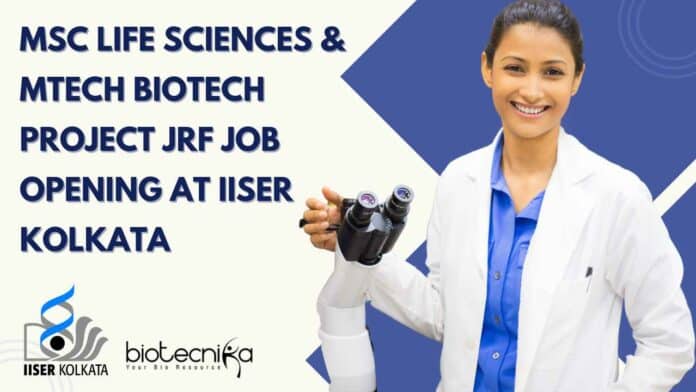IISER Kolkata MTech Biotech MSc Life Sciences Project JRF Job
IISER Kolkata MTech Biotech MSc Life Sciences Project JRF Job. MSc jobs. MTech Biotechnology Project Junior Research Fellow job. MSc JRF Jobs. Interested and eligible applicants can check out all of the details on the same below
Possible Interview Questions and Answers are posted below
This job expires in
Walk in interview for the position of Project- JRF on a DBT Builder
project funded project at IISER Kolkata
A project JRF position is available on a DBT Builder project funded project at IISER Kolkata. The candidates will work at the Common Instrument Facility at the Department of Biological Sciences, Indian Institute of Science Education and Research Kolkata.
Name of the Post: Project JRF
Number of vacancies: 1
Scope: The candidate will be required to be involved with the training, usage and maintenance of the Super-resolution imaging facility
Duration: 3 months – extensions up to 3 years based on performance.
How to Apply:
Documents required
- CV with names of 3 referees
- A short (~500 words) write-up about why they would be interested in the position
- All mark sheets and certificates with their copies
Candidates may send the
copies of above documents by email to [email protected] with the following subject line: APPLICATION FOR JRF – BUILDER (MICROSCOPY) (Note: without this subject line the email might be missed)- Date of Walk-in Interview: 20th July 2023.
- Reporting Time: 10 am
- Venue: 2nd Floor Research Complex, DBS office, Dept of Biological Sciences, IISER Kolkata, Mohanpur Campus, Mohanpur, Nadia-741246 (Opposite AIIMS Kalyani)
Contact: [email protected].
Essential Qualifications: M.Sc. in Life Sciences/ Chemistry /Physics or M.Tech with training in Biotech. Candidate must have qualified NET or GATE.
Desirable: Experience in biology and microscopy will be highly preferred; experience in wet lab/ cell culture; knowledge of basic images/data analysis are desired.
Fellowship: JRF emoluments will be as per DST rules.
Check the notification below
Possible Interview Questions and Answers:
- Can you explain your experience and training in biotechnology, specifically in the context of microscopy? Answer: I have a Master’s degree in Life Sciences with training in Biotechnology. During my academic studies, I received hands-on training in various microscopy techniques such as confocal microscopy and super-resolution imaging. I have also worked on microscopy-based research projects during my academic career.
- How familiar are you with the usage and maintenance of super-resolution imaging facilities? Can you provide examples of specific equipment or instruments you have worked with? Answer: I have practical experience in using super-resolution imaging facilities, including the operation and maintenance of advanced microscopy instruments. For instance, I have worked with instruments like STED microscopy and structured illumination microscopy (SIM). I am proficient in handling sample preparation, adjusting imaging parameters, and troubleshooting common issues related to microscopy.
- Can you discuss your knowledge and experience in data analysis related to microscopy images? How have you utilized software or tools for image processing and analysis? Answer: I have a solid understanding of basic image analysis techniques. I am skilled in using software such as ImageJ/Fiji and MATLAB for image processing, quantitative analysis, and generating meaningful data from microscopy images. I have utilized these tools to analyze parameters such as fluorescence intensity, colocalization, and morphological features in biological samples.
- Have you previously worked in a wet lab or cell culture environment? Can you elaborate on your experience in these areas? Answer: Yes, I have practical experience in working in a wet lab and cell culture setting. I have performed various wet lab techniques such as DNA extraction, PCR, gel electrophoresis, and protein analysis. Additionally, I have worked with cell lines and primary cell cultures, maintaining cell cultures, performing transfections, and conducting cell-based assays.
- Can you provide an example of a project or research experience where you applied microscopy techniques to investigate a biological phenomenon? What were the outcomes or findings of the study? Answer: During my Master’s program, I conducted a research project where I utilized confocal microscopy to study the intracellular localization of a specific protein in cancer cells. Through immunofluorescence staining and confocal imaging, I successfully visualized the protein’s distribution and identified its subcellular compartments. This study provided valuable insights into the protein’s role in cellular processes and contributed to our understanding of cancer biology.
Remember to personalize your answers based on your own experience and highlight specific projects or research work that demonstrate your skills and knowledge in microscopy, data analysis, and wet lab techniques.
Editor’s Note: IISER Kolkata MTech Biotech MSc Life Sciences Project JRF Job. Please ensure you are subscribed to the Biotecnika Times Newsletter and our YouTube channel to be notified of the latest industry news. Follow us on social media like Twitter, Telegram, Facebook






























